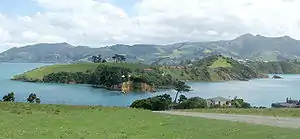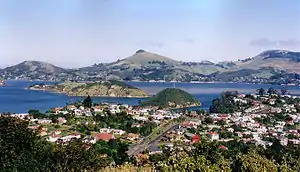Quarantine Island / Kamau Taurua
Quarantine Island/Kamau Taurua is the largest island in Otago Harbour, close to the city of Dunedin, New Zealand.

| Kamau Taurua (Māori) | |
|---|---|
 Looking across Port Chalmers to the Otago Peninsula. Quarantine Island/Kamau Taurua is visible to the left of the picture, and Goat Island / Rakiriri in the centre. | |
| Geography | |
| Location | Otago Harbour |
| Coordinates | 45.828216°S 170.633104°E |
| Area | 15 ha (37 acres) |
| Administration | |
New Zealand | |
| Demographics | |
| Population | 4 (2019) |
| Additional information | |
| Jointly managed by the QIKT Community Inc and Depoartment of Conservation | |
The island covers an area of 15 hectares (37 acres), and is a publicly accessible recreation reserve. The buildings on the island are owned by Quarantine Island/Kamau Taurua Community (QIKTC). Its management is shared between QIKTC and the Department of Conservation.
A smaller island, Goat Island / Rakiriri, lies close to Quarantine Island. Both islands lie across the harbour between the town of Port Chalmers and the marine laboratory on Portobello Peninsula, part of the Otago Peninsula.
Names
The island has been known by a number of names, including St Martin Island. In 1996 as part of the Ngāi Tahu settlement the name of Kamau Taurua,[1] meaning 'a place to set nets' was restored as part of the official name.[2]
History
The island served as the quarantine station for Otago from 1863 until 1924. It was one of four in NZ.[3] When ships arrived in Otago harbour with infectious diseases, passengers were quarantined for that disease, usually one to two weeks, but sometimes longer. The few passengers that were actually sick were treated in the hospital on top of the island. In total 41 ships were quarantined at the island. Of about 9000 people quarantined about 70 died. There is a small cemetery on the island where they and some of the keeper's family are buried.
During the First World War, soldiers who had venereal diseases (either diagnosed when they volunteered or acquired abroad) were treated on the island, then called the 'Port Chalmers Military Hospital'. However, most NZ soldiers with VD were treated overseas.[4]
Only one of the main quarantine buildings from these years has survived, and this is now saved. The island has a NZ Historic Places Trust Historic Area classification.[5] After the quarantine station closed in 1924 the buildings were sold and island was leased.
Visitors
Now the area around the buildings is leased by Quarantine Island/Kamau Taurua Community, established in 1958 as St Martin Island Community, and the remainder jointly managed by the Community and the Department of Conservation. The resident keeper welcomes visitors to St Martin Lodge, and oversees a wide range of ecological, educational, historical and cultural projects.
Notes
- "List of place names to be amended". New Zealand Government. Archived from the original on 7 December 2008. Retrieved 24 January 2009.
- "Place name detail: Quarantine Island / Kamau Taurua". New Zealand Gazetteer. New Zealand Geographic Board. Retrieved 24 January 2009.
- Weekes, John (9 February 2020). "Quarantined: A sordid, sickly, sad underside of New Zealand history". Stuff. Retrieved 16 February 2020.
- "Island of shame |". Retrieved 18 September 2020.
- "Search the List | Quarantine Island / Kamau Taurua Historic Area | Heritage New Zealand". www.heritage.org.nz. Retrieved 29 November 2018.
References
- Peat, N & Patrick, B (2002) Wild Dunedin, University of Otago Press, Dunedin
- Russell and McGeorge, P (2004) New Zealand's Islands, Bateman.
- Herd, J. & Griffiths, G.J. (1980). Discovering Dunedin. John McIndoe. ISBN 0-86868-030-3.
- Hancock, L (2008) Quarantine Island / Kamau Taurua (St Martin Island) A short history St Martin Island Community, Dunedin. ISBN 978-0-473-14209-4
External links
| Wikimedia Commons has media related to Quarantine Island / Kamau Taurua. |
- Nearshore islands Te Ara - the Encyclopedia of New Zealand
- The Island Quarantine Island / Kamau Taurua Community (Inc) Information
- The keeper of Quarantine Island RNZ interview, 6 October 2020
